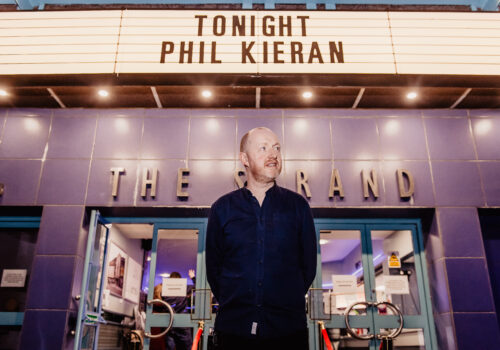Is Ireland ready for nightclubs to stay open until 6am?
Words: Eva O’Beirne
Artwork: Paul Smith
How can we expect a dying nightlife industry to cope with an increase in opening hours?
Going out late in Ireland often feels like a survival mission. Between getting oiled at pre-drinks (but not so much that you’re refused entry), dodging the ten euro pints at the bar and acquiring a taxi home, it’s nearly not worthwhile to go out on a Saturday anymore.
So is Ireland really ready for a late-night economy? District has examined all the red flags that need to be looked at before we can dance until the AM.
The Transport Issue
Hearing the news that incoming legislation in the Dáil could extend venues’ opening hours until 06:00 was a momentary cause for celebration. Due before TDs and senators before the summer break, the new bill would bring Ireland in line with other European countries such as Germany which are hailed for their nightlife culture.
This is all well and good until you consider that Ireland barely has the infrastructure to cope with the current 02:30 closing requirements. From Dublin taxi shortages to overpriced, sporadic late-night transport, how can we expect customers to attend late-night venues if the staff can barely afford to get to work?
The Government needs to overhaul existing structures and implement efficient and affordable public services, especially outside of the capital.
District Magazine
For this legislation to work and to reap the benefits of a late-night economy, the Government needs to overhaul existing structures and implement efficient and affordable public services, especially outside of the capital.
The Night-Time Economy Taskforce report has (thankfully) recommended the instruction of eight new 24-hour bus routes in Dublin city, a new 24-hour regional service on Route 101, between Dundalk, Drogheda and Dublin, and Dublin, Naas, and Newbridge in response to the legislation. Bus services in Cork, Limerick, Galway and Waterford were also recommended for improvement.
But what the task force may fail to consider is the price of tickets for these services. A NiteLink from Dublin City Centre currently costs 4.50 euro for Leap Card users or 6.60 cash fare. Whether it is free travel for late-night hospitality workers on public transport or subsidised fares, the Government cannot place the financial burden of a late-night economy on hospitality workers.
The Venue Issue
Late-night closing times can only do so much if the venues to accommodate nightlife don’t exist. For context, Galway city’s last nightclub looks set to close following a decision by An Bord Pleanála to approve plans to develop a hotel on the site of the premises. Similar fates have been imposed on nightclubs outside of Dublin due to little support throughout the pandemic.
The capacity of Dublin venues has decreased from 25,000 in 2012 to 11,000 in 2022.
District Magazine
Limited opportunities combined with a rising cost of living and a declining amount of venues for artists in the capital has caused the revival of campaigns such as Give Us The Night in order to raise awareness about the declining state of Ireland’s nightlife.
In an interview with District in January, campaigner and DJ Robbie Kitt spoke to us about the rapid decline of cultural spaces in Dublin, describing how “the rot had set in before the pandemic started, but the pandemic accelerated the erosion of these spaces for self-expression.”
The capacity of Dublin venues has decreased from 25,000 in 2012 to 11,000 in 2022. The last purpose-built venue to open in Dublin was The Wright Venue in 2009. How can a late-night economy boom if the venues for these activities don’t exist?
The Cost Issue
The issue also facing publicans and nightclub owners will be finding staff to manage venues during these later hours. Whether it is in the form of a living wage or better workplace facilities and benefits, hospitality workers cannot be expected to work until eight or nine in the morning on minimum wage. A living wage, approximately 12.90 per hour, is the bare minimum staff deserve for working these unsociable hours.
Drink prices, especially in Dublin, will have to be lowered in order for late-night events to become attractive to locals and tourists alike.
Being able to afford a night out is essential for the concept of a 06:00 closing time to get off the ground.
District Magazine
The Safety Issue
If clubs and bars are expected to be pillars of the late-night economy, they need to drastically improve their safety protocols. From spiking to sexual assault, venues routinely fail victims due to their standards of security.
According to recent figures from An Garda Síochána, 73 incidents of spiking by needle or drink were reported between October 1, 2021, and February 14, 2022. Of those incidents, 19 were reported between January 1 and February 14 alone. National policies to tackle spiking and club safety have been frequent but scattered. They’ve certainly increased in recent months due to reports of spiking by needles, but the responsibility to avoid being spiked rests on individuals.
Whether it’s first responders’ training or simply knowing the signs of when someone has been spiked, there needs to be a coordinated national response to spiking and club safety, as soon as possible.
73 incidents of spiking by needle or drink were reported between October 1, 2021, and February 14, 2022.
District Magazine
The safety issue is also linked to transport. We can talk about train services and bus routes all we’d like, but what also matters is the provision of shelters and brightly-lit places for both staff and customers to wait in for their trips home.
Expecting college students and barely eighteen-year-olds to be able to hang around in the city centre at four or five in the morning without anywhere to sit or even stay dry is a recipe for disaster.
Hopefully, once this legislation is put in, all the issues we’ve raised will be non-existent or at the very least, reduced. But for the moment, a 06:00 closing time may ruin the Irish nightlife industry instead of saving it.
Elsewhere on District: Spiking in Ireland is on the rise and it needs to be tackled. Now.






